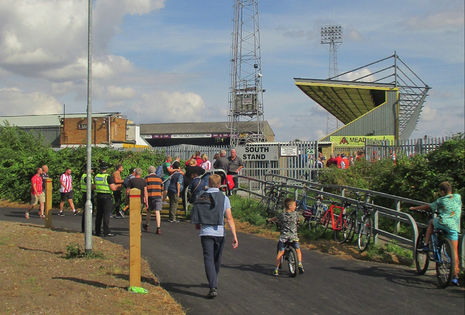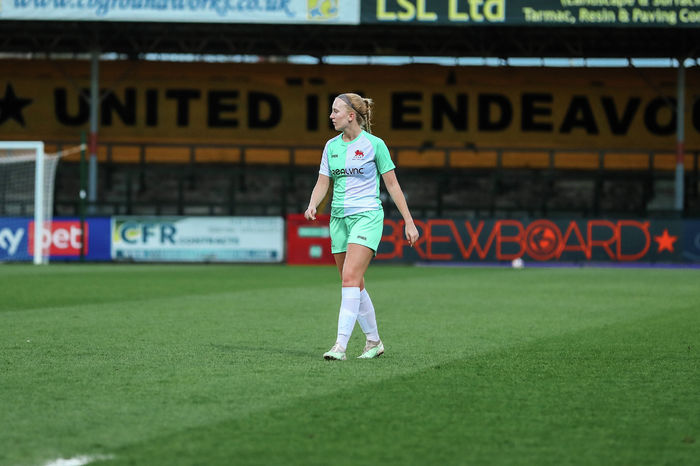Between ambition and responsibility: Cambridge United and the future of lower-league football
Max Eshelby talks to Cambridge United CEO Alex Tunbridge about the unique challenges facing the U’s

Lower-league football is often spoken about in terms of survival rather than success. Away from the bright lights of the Premier League, clubs like Cambridge United operate in a world where financial stability is fragile, resources are stretched, and the connection with the local community is as important as results on the pitch.
For Alex Tunbridge, the CEO of Cambridge United, steering the club through these challenges means striking a delicate balance between ambition and responsibility. In conversation with Varsity, he reflected on the unique pressures facing clubs in the lower echelons of the game, the impact of new regulations, and his hopes for the future of the U’s. This also comes at an important time, as English football grapples with broader questions of governance and sustainability. The recent turmoil at Sheffield Wednesday and Morecambe has highlighted just how vulnerable clubs outside the top flight can be to poor financial management, sparking growing calls for reform and greater protections of football clubs.
“The biggest challenges facing lower-league clubs like Cambridge at the moment are mainly financial sustainability, competition, and keeping fans engaged,” Tunbridge explained. Unlike clubs in the top-flight, Cambridge cannot rely on consistent broadcasting riches or the commercial clout of global sponsors. Instead, they depend heavily on matchday income – a revenue stream as vulnerable to poor weather as it is poor form. Rising costs, from player wages to stadium upkeep, only deepens the difficulty of keeping budgets under control. At the same time, the club faces a constant battle to hold on to talented players, who are frequently tempted away by bigger sides. The result, Tunbridge notes, is a cycle of rebuilding that often pushes clubs into “risky spending” in order to remain competitive.
“Setting up an authority isn’t enough if clubs can bypass rules or if enforcement is weak”
This fragility has become all too visible in recent years. Poor ownership and financial mismanagement has seen clubs like Bury and Macclesfield exit the Football League and face dissolution. Other clubs, like Hull City and Blackpool, have had high-profile struggles between supporters and their owners. The government’s response has been to establish an Independent Football Regulator, a move that Tunbridge cautiously welcomes. “A regulator could help by enforcing stricter financial rules, improving transparency, and holding owners accountable,” he said, stressing the importance of protecting clubs from the mismanagement that has the potential to devastate communities. Yet Tunbridge also stressed that its success will entirely depend on how robustly the regulator is empowered to act, warning that “simply setting up an authority isn’t enough if clubs can bypass rules or if enforcement is weak”. For lower-league football, genuine oversight may be the difference between survival and collapse.
For Cambridge specifically, the greatest challenge lies in balancing the desire for progress with the need for stability. Tunbridge admits that there is always pressure to invest in the squad, but insists that the club’s strategy is guided by restraint. “Our priority is always to run the club responsibly and avoid putting ourselves in a precarious position financially,” he explained. Rather than chasing short-term success through heavy spending, the U’s are committed to nurturing young talent, through strategic transfers and strengthening the club’s academy infrastructure. As Tunbridge puts it: “Ambition is important, but it has to be grounded in reality.”
This sober approach to financial management is all the more necessary in a landscape that is increasingly shaped by an influx of wealthy owners. Clubs like Wrexham, Salford City, and Forest Green Rovers – backed by celebrity investors with deep pockets – have brought welcome attention to the lower leagues, but they have also introduced a new imbalance. Tunbridge admitted that the financial power of these clubs has created a widening gap with “more traditionally-run teams”, which has “made the playing field less even.” The risk, he argues, is that other clubs will feel compelled to overspend in order to remain competitive. The influx of investment may shine a spotlight on these leagues, but it is a novelty that perhaps threatens to distort competitiveness.
“Ultimately, it’s about creating a club that supporters can be proud of”
Broadcasting is another double-edged sword. The new Sky broadcasting deal, which will see more League One and Two games televised, has been hailed as a breakthrough for exposure and revenue. But for clubs and supporters alike, the reality of inconvenient kick-off times and dwindling attendances have become a cause for concern. Alex is sympathetic to these frustrations; whilst he acknowledges that the deal will provide a vital stream of revenue, he notes: “There’s a genuine concern about attendances and making it harder for fans to come to the ground.” The success of the deal, in his view, will depend on whether clubs can harness the financial benefits while ensuring that matchdays remain at the heart of the supporter experience.
Looking ahead, Alex envisions a future for Cambridge United that rests both on consolidation and growth. He hopes that in the years ahead, the U’s will be consistently challenging for promotion and developing a talented pipeline of young players. Just as importantly, Alex wants to see the stadium improved, the fanbase expanded, and the club’s bond with the community strengthened. “Ultimately, it’s about creating a club that supporters can be proud of, now and in the future and one that represents our fantastic city,” he reflected.
So for Cambridge United, success is not about quick fixes or headline-grabbing signings. It is about steady progress rooted in realism, creating a club that is responsible, competitive, and engaged with its local community. The test over the next decade will be whether patience can deliver not only stability, but the kind of enduring pride that will see the stands of the Abbey Stadium filled in years to come.
 News / Judge Business School advisor resigns over Epstein and Andrew links18 February 2026
News / Judge Business School advisor resigns over Epstein and Andrew links18 February 2026 News / Hundreds of Cambridge academics demand vote on fate of vet course20 February 2026
News / Hundreds of Cambridge academics demand vote on fate of vet course20 February 2026 News / Petition demands University reverse decision on vegan menu20 February 2026
News / Petition demands University reverse decision on vegan menu20 February 2026 News / CUCA members attend Reform rally in London20 February 2026
News / CUCA members attend Reform rally in London20 February 2026 News / Gov grants £36m to Cambridge supercomputer17 February 2026
News / Gov grants £36m to Cambridge supercomputer17 February 2026










